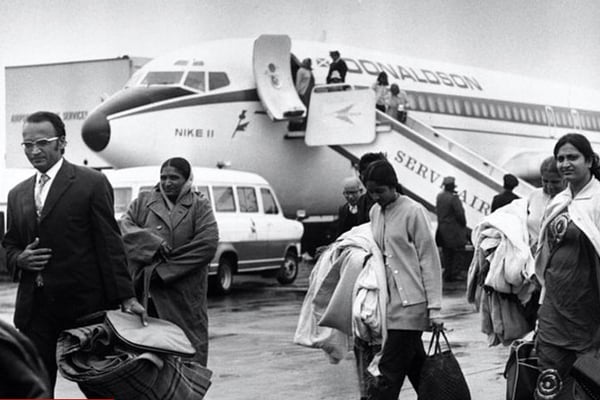Prime
50th anniversary of Asian expulsion

Aarshi Dua
What you need to know:
Asians had not just lost their livelihoods and identities but the Pearl of Africa had also lost its sheen
The expulsion of Asians from Uganda in August 1972 is considered one of the darkest events in the Ugandan history, especially for Asians.
The expulsion did not only impact the Asian population but had a profound effect on the native Ugandans as well.
President Idi Amin gave Asians 90 days to depart from Uganda. His primary argument was Asians came to Uganda to construct the railways and since the job was complete, they had no reason to stay.
In addition, Amin accused Asians of economic sabotage because of their unwillingness to contribute and invest in the growth and development of Uganda.
He also accused Asians for monopolising enterprises and depriving black Africans the opportunity to flourish.
National newspapers propagated the Amin ideology with headlines such as “All Asians must go”, and “Asians milked the cow, they did not feed it.”
The expulsion may have appealed to the local populace at the time, but its effects such as economic deterioration, poverty, inflation, corruption, military rule, unstable administrations, lack of infrastructure, black markets, and expanding mafia were unanticipated by all.
Furthermore, Amin gave businesses and farmland owned by expelled Asians as presents to appease the Ugandan troops. This led to corruption, smuggling, and other illicit activities and resulted in the social and political vacuum in Uganda.
It also resulted in the failure and regression of the Ugandan economy and development by 20 years
The psychological implication of the expulsion of the Asians was fathomless. They were forced out of their homes and well-established lifestyles with almost nothing but clothes on their backs. The fear of being arrested or targeted by the Amin’s soldiers was very predominant among the Asian population. The arrest of Manubhai Madhvani was a signal for the Asians that if the Madhvani’s were not safe , then the chances of others escaping it were very low.
The Asian stories of expulsion reflect multiple perspectives and experiences. From being jailed, leaving, to escaping all reflect a situation of uncertainty and heartbreak for the Asians.
Uncertainty was also experienced by the Asians who stayed in Uganda; however, they also reflect on the easing out of the pressure by the Amin regime especially in context of the skilled professionals and expatriates by 1973.
The expelled Asians recall stories of living in the refugee camps, families being separated, legacies and business being left behind and most importantly their very identities of being Ugandans or British Asians in Uganda were lost and they became refugees and dependents.
“I have lost my family on plane; I have lost my home on plane.” Such statements reflect the immediate aftermath of expulsion of the Asians. From doing charity, they became charity cases which had a profound impact on their psychology and mindset.
Thus, as a consequence of expulsion of Asian community from Uganda 50 years ago, the Asians had not just lost their livelihoods and identities but the Pearl of Africa had also lost its sheen. It became a poor imitation of its old self.
It has taken a long time to overcome this dark event in Ugandan history. Even after 50 years the traces of it still regenerate in the politically active climate or as examples of global refugee crises in the world citing its relevance in the global political history.
The writer Aarshi Dua is a doctoral fellow, Centre for African Studies, School of International Studies, Jawaharlal Nehru University, India




